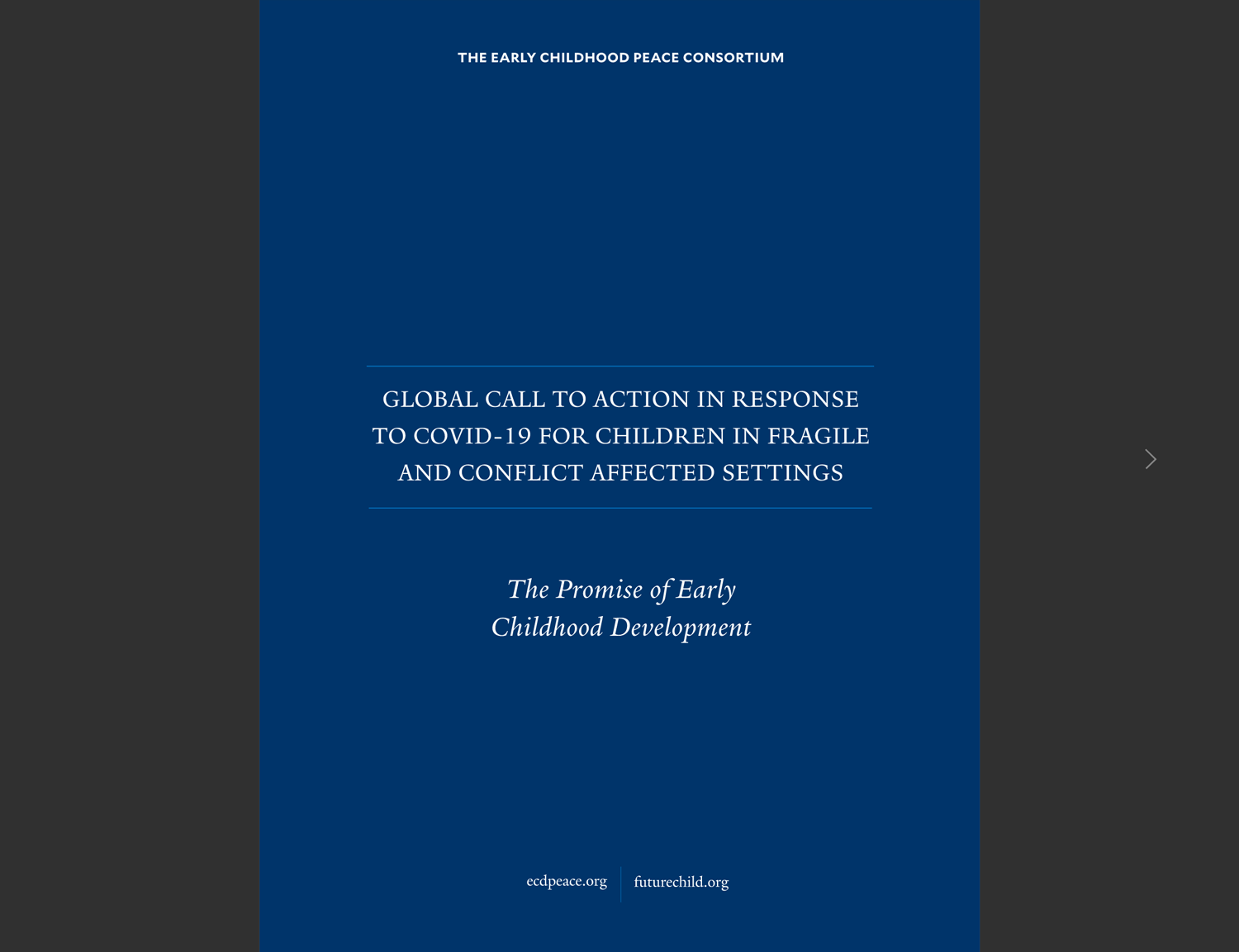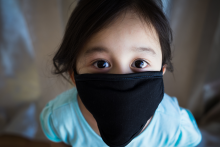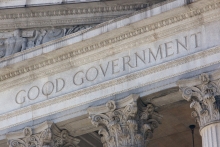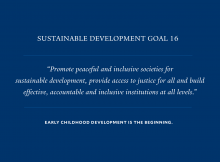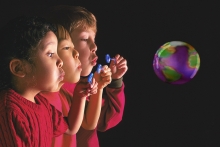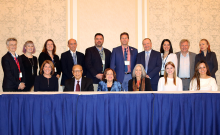The ECPC Global Call to Action in Response to COVID-19 for Children in Fragile and Conflict-affected Settings
Click above to read the interactive and sharable ECPC Global Call to Action brochure.
ECPC Global Call to Action in response to COVID-19 for children in fragile and conflict affected settings: The promise of early childhood development
“The ECPC strongly supports the United Nations Secretary-General Antonio Guterres’ appeal to protect the rights of children and safeguard their well-being during and after the COVID-19 pandemic.”
(Web version)
WHO WE ARE
“We stand in solidarity and collaborate with the United Nations Secretary-General, UNICEF, WHO and all other United Nations agencies, as well as with governments, religious leaders, non-governmental organizations, academia, early childhood networks and civil society as a whole in the response to the global pandemic humanitarian crisis, to mitigate its impact on families and young children living in situations of conflict, military occupation, and displacement.”
IMPACT ON THE MOST VULNERABLE CHILDREN
The COVID-19 outbreak and containment measures exacerbate existing crises and further violate vulnerable children’s rights. The pandemic severely affects young children’s physical and mental health, their social and emotional development, safety, economic security, access to education, play, recreational activities and more (United Nations, 2020).
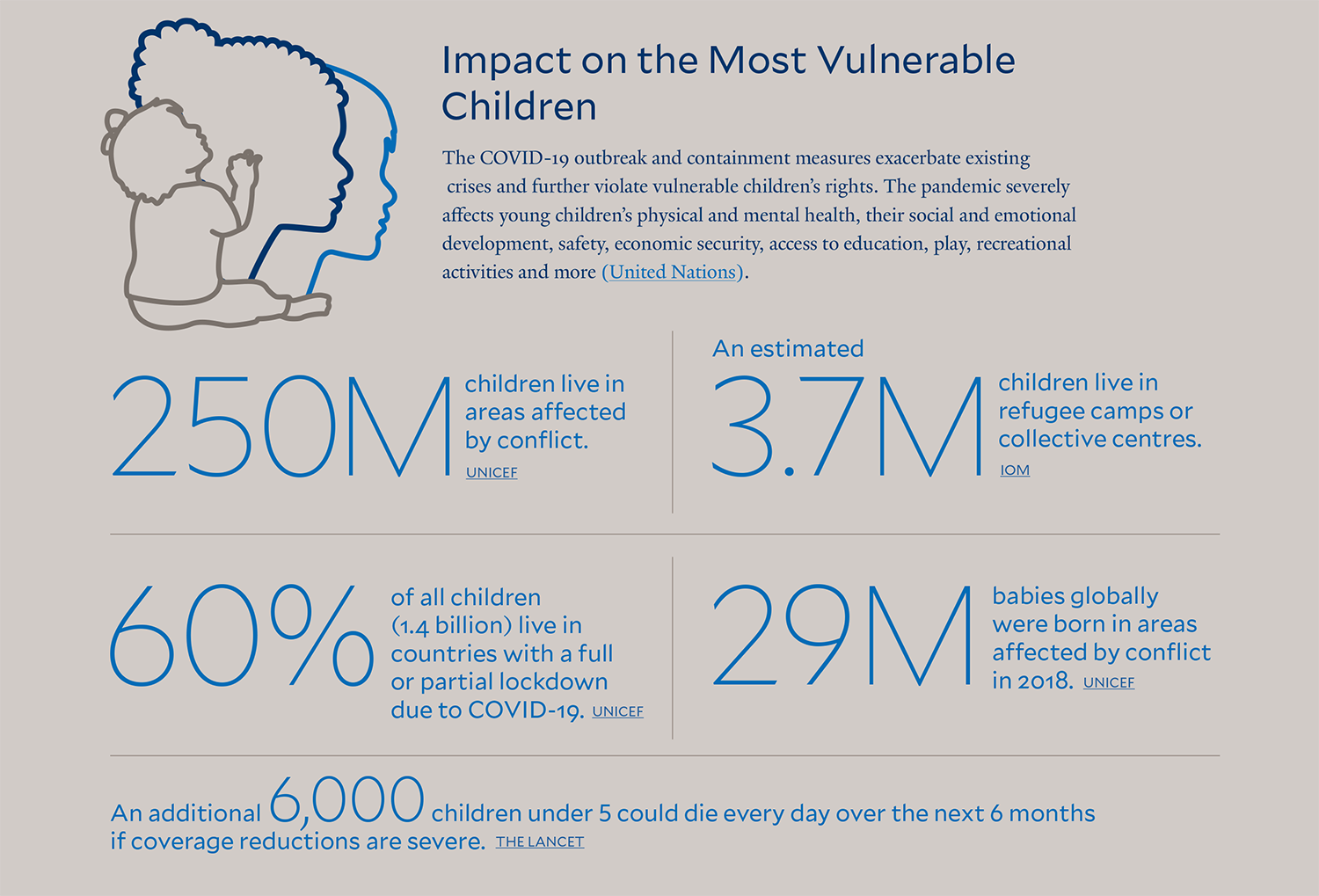
CHILDREN LIVING IN FRAGILE AND CONFLICT AFFECTED SETTINGS
CHILDREN ON THE MOVE
In camps or in overcrowded detention centres, the uprooted often live in deeply unsafe and highly stressful environments with no possibility of social distancing (CRC COVID-19 Statement, 2020). This pandemic also poses greater challenges for migrant and displaced families and children as they are faced with higher rates of deportation and mass expulsions; these practices threaten children’s rights and are a risk to public health.
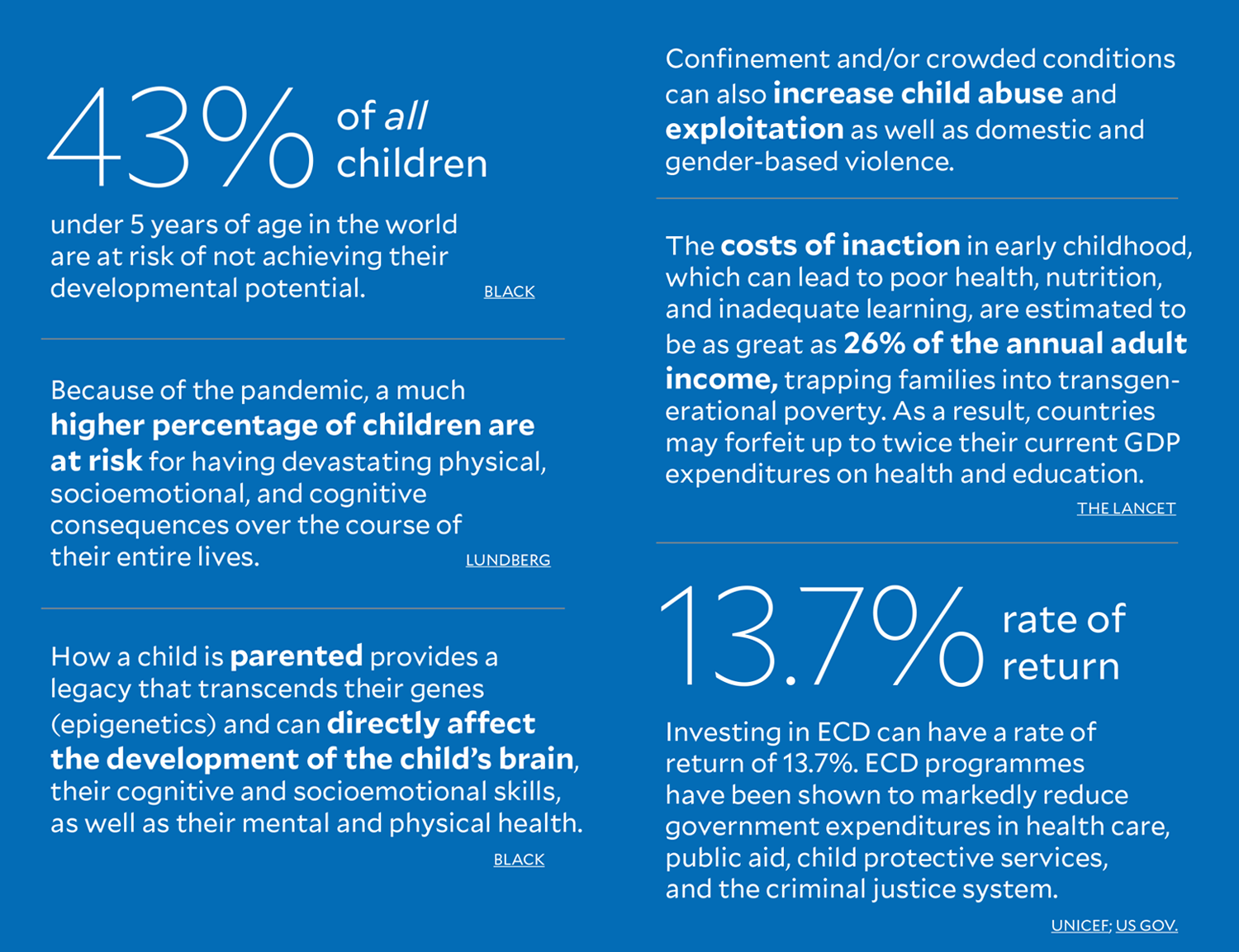
WHAT DOES SCIENCE TEACH US ON THE IMPORTANCE OF EARLY CHILDHOOD DEVELOPMENT IN THE CONTEXT OF COVID-19?
BUILDING A FUTURE FIT FOR THE WORLD’S CHILDREN
Recommendations
IMMEDIATE
• Maintain and further invest in quality programmes and services for families and their young children that live in situations of conflict, military occupation (Watchlist, 2020) and displacement during the COVID-19 response efforts (Yoshikawa et al., 2020).
• Ensure that essential child protection services are recognised as lifesaving and continue to be provided and made accessible to all children even during lockdowns, quarantines and other types of restrictions.
• Prioritise protection of young children, who in this time of crisis are highly susceptible to neglect, abuse, violence, exploitation, and stigma as their parents/caregivers experience increased instability and stress, which may result in long-term and irreversible negative consequences.
• Use mass media – radio, television and social media – to promote psychosocial support, cognitive development, nutrition and physical activity. Ensure existing online resources are accessible and address pre-existing inequalities in fragile and conflict affected settings. Ensure children’s experiences are safe and positive during the COVID-19 pandemic (UNICEF, 2020).
• Invest in new research to understand the impact of COVID-19 on children and their families:
(i) the adverse impact of the pandemic on parents/caregivers and their ability to provide nurturing care for their children;
(ii) the social-emotional impact of the virus and (the measures to control it) on children;
(iii) the role children play as vectors of the infection; and
(iv) the underlying biology and optimal treatment for the newly identified PMI syndrome that is associated with COVID-19. A more evidence-based understanding of these issues will help governments in their decision making about opening or closing early childhood development (ECD) centres and schools at various stages of the pandemic.
MEDIUM-TERM
• Ensure an inclusive approach for all children and their families living in situations of conflict, military occupation and fragility, including migrants, refugees and internally displaced persons, who have a right to the highest attainable standard of health (OHCHR, 2008). Those children should be entitled to protection for themselves and their families, including having access to testing and early detection for COVID-19, and the means to physically distance, self-isolate and take other appropriate physical and mental health measures (IASC, 2020).
• Uphold the rights of vulnerable children and their families as we emerge from this pandemic into recovery. It is vital to have ECD programmes that are multileveled, benefiting the child and parents/caregivers, the community, and institutions at national, regional and local levels. Programmes should be safe, protective, inclusive, accessible and most importantly, culturally sensitive, to allow children and their families the space they need to be the driving force for social change.
• Protect women’s and girl’s rights, without discrimination, and support community-based action through gender-based analysis to favour their empowerment and social inclusion.
LONG-TERM
• Build on the extensive body of international research on the power of ECD to promote peace and sustainable development.
• Invest in strengthening systems (e.g. through financial resources, capacity building, personnel training) with a holistic and whole-of-government (multi-ministry) approach.
Five-point Global Call to Action
- Reaffirm commitment to human rights and the rights of children that are being undermined during the global pandemic crisis.
- Prioritise investment in the survival, development and protection of children living in situations of conflict, military occupation, and displacement.
- Protect and prioritise investments in Early Childhood Development programmes and services in the global pandemic response and recovery efforts.
- Ensure that gender equality, inclusion and empowerment of children, parents/caregivers, families and communities be at the centre of COVID-19 response and recovery efforts.
- Implement more effective policies and practices in all countries, ensuring that early childhood programmes and services are essential in promoting The Culture of Peace (UN Resolution /RES/74/21) and in sustaining peace.
References
- Ardittis, S., & Laczko, F. (Eds.). (2020). A new challenge for migration policy. [Special Issue]. Migration Policy Practice. X(2).
- Barrero-Castillero A, Morton SU, Nelson CA 3rd, Smith VC. (2019). Psychosocial Stress and Adversity: Effects from the Perinatal Period to Adulthood. Neoreviews. 20(12):e686-e696.
- Black MM, Walker SP, Fernald LCH, et al. (2017. Early childhood development coming of age: science through the life course. Lancet. 389(10064):77-90.
- Britto PR. (2017). Early Moments Matter for every child. United Nations Children’s Fund (UNICEF).
- Early Childhood Peace Consortium (ECPC). (2018). Contributions of early childhood development programming to sustainable peace and development. New York: Early Childhood Peace Consortium.
- End Violence Against Children. (2020, April 24). Leaders call for action to protect children during COVID-19. End Violence Against Children.
- Executive Office of the President of the United States. (2014). The economics of early childhood investments.
- Fore H. (2020, April 17). COVID-19: Global ceasefire would be a gamechanger for 250 million children living in conflict-affected areas. UNICEF.
- Fore, H. & Grandi, F. (2020, April 20). As COVID-19 pandemic continues, forcibly displaced children need more support than ever. UNHCR.
- Fore, H. (2020, April 9). Don’t let children be the hidden victims of COVID-19 pandemic. UN News.
- Inter-Agency Standing Committee (IASC). (2020, March 17). Interim guidance. Scaling-up COVID-19 outbreak readiness and response operations in humanitarian situations: Including camps and camp-like settings.
- Ludvigsson JF. (2020). Systematic review of COVID-19 in children shows milder cases and a better prognosis than adults. Acta Paediatr. 109(6):1088-1095.
- Lundberg., M & Wuermli, A. (2012). Children and youth in crisis: Protecting and promoting human development in times of economic shocks. Washington DC: The World Bank.
- Office of the United Nations High Commissioner for Human Rights. (2008). The right to health. Factsheet 31. Genera, Switzerland: OHCHR.
- Richter LM, Daelmans B, Lombardi J, et al. (2017). Investing in the foundation of sustainable development: pathways to scale up for early childhood development. Lancet. 389(10064):103-18.
- Roberton T, Carter ED, Chou VB, et al. (2020). Early estimates of the indirect effects of the COVID-19 pandemic on maternal and child mortality in low-income and middle-income countries: a modelling study. Lancet Glob Health. 8(7):e901-e908.
- Shonkoff JP, Garner AS, et al. (2012). The lifelong effects of early childhood adversity and toxic stress. Pediatrics. 129(1):e232-e246.
- Shonkoff JP, Williams DR. (2020, April 27). Thinking about racial disparities in COVID-19 impacts through a science-informed, early childhood lens. Center for the Developing Child, Harvard University.
- UN News. (2020, March 23). COVID-19: UN chief calls for global ceasefire to focus on ‘the true fight of our lives’.
- UN News. (2020, May 6). COVID-19 crisis putting human trafficking victims at risk of further exploitation, experts warn.
- UN News. (2020, May 8). UN chief appeals for global action against coronavirus-fueled hate speech. .
- UNICEF. (2019, September 2019). 29 million babies born into conflict in 2018.
- UNICEF. (2020). Coronavirus (COVID-19) guide for parents.
- UNICEF. (2020, April 23). Children at increased online risk during COVID-19 pandemic.
- UNICEF. (2020, March 13). Handwashing with soap, critical in the fight against coronavirus, is ‘out of reach’ for billions–UNICEF.
- United Nations General Assembly (UNGA). (2019, December 18). Follow-up to the Declaration and Programme of Action on a Culture of Peace, A/RES/74/21.
- United Nations Human Rights (UNHR). (2020, April 8). The Committee on the Rights of the Child warns of the grave physical, emotional and psychological effect of the COVID-19 pandemic on children and calls on States to protect the rights of children.
- United Nations. (2020). Policy Brief: The Impact of COVID-19 on children.
- Verdoni L, Mazza A, Gervasoni A, et al. (2020). An outbreak of severe Kawasaki-like disease at the Italian epicentre of the SARS-CoV-2 epidemic: an observational cohort study. The Lancet. 395(10239): 1771-78.
- Watchlist on Children and Armed Conflict. (2020, April). COVID-19 and children in armed conflict. Factsheet.
- World Health Organization (WHO). (2020). Coronavirus disease (COVID-19) advice for the public.
- Yoshikawa H, Wuermli AJ, Britto PR, et al. (2020). Effects of the Global COVID-19 Pandemic on Early Childhood Development: Short- and Long-Term Risks and Mitigating Program and Policy Actions [published online ahead of print]. J Pediatr. S0022-3476(20)30606-5.
Topics & initiatives
|
|
|
|
|
|
|
|
|
|
|
|
JOIN THE CONVERSATION
For breaking news and to stay connected, follow us on social media. Sign up to get our E-News delivered straight to your inbox.


